初中英语时态句型总结
- 格式:ppt
- 大小:947.00 KB
- 文档页数:28
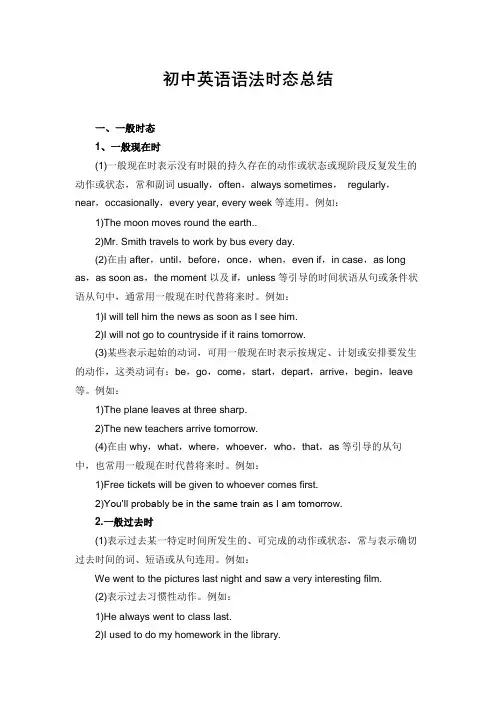
初中英语语法时态总结一、一般时态1、一般现在时(1)一般现在时表示没有时限的持久存在的动作或状态或现阶段反复发生的动作或状态,常和副词usually,often,always sometimes,regularly,near,occasionally,every year, every week等连用。
例如:1)The moon moves round the earth..2)Mr. Smith travels to work by bus every day.(2)在由after,until,before,once,when,even if,in case,as long as,as soon as,the moment以及if,unless等引导的时间状语从句或条件状语从句中,通常用一般现在时代替将来时。
例如:1)I will tell him the news as soon as I see him.2)I will not go to countryside if it rains tomorrow.(3)某些表示起始的动词,可用一般现在时表示按规定、计划或安排要发生的动作,这类动词有:be,go,come,start,depart,arrive,begin,leave 等。
例如:1)The plane leaves at three sharp.2)The new teachers arrive tomorrow.(4)在由why,what,where,whoever,who,that,as等引导的从句中,也常用一般现在时代替将来时。
例如:1)Free tickets will be given to whoever comes first.2)You’ll probably be in the same train as I am tomorrow.2.一般过去时(1)表示过去某一特定时间所发生的、可完成的动作或状态,常与表示确切过去时间的词、短语或从句连用。
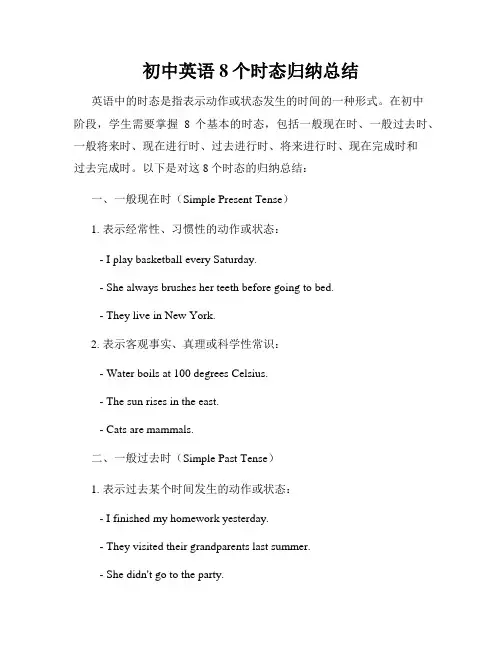
初中英语8个时态归纳总结英语中的时态是指表示动作或状态发生的时间的一种形式。
在初中阶段,学生需要掌握8个基本的时态,包括一般现在时、一般过去时、一般将来时、现在进行时、过去进行时、将来进行时、现在完成时和过去完成时。
以下是对这8个时态的归纳总结:一、一般现在时(Simple Present Tense)1. 表示经常性、习惯性的动作或状态:- I play basketball every Saturday.- She always brushes her teeth before going to bed.- They live in New York.2. 表示客观事实、真理或科学性常识:- Water boils at 100 degrees Celsius.- The sun rises in the east.- Cats are mammals.二、一般过去时(Simple Past Tense)1. 表示过去某个时间发生的动作或状态:- I finished my homework yesterday.- They visited their grandparents last summer.- She didn't go to the party.2. 表示过去的经历或习惯:- When I was young, I often went swimming. - He always ate breakfast at 8 o'clock.三、一般将来时(Simple Future Tense)1. 表示将来要发生的动作或事件:- I will go shopping tomorrow.- They are going to have a picnic next week. - She won't be late for the meeting.2. 表示将来的打算或意愿:- I am going to be a doctor when I grow up.- We will help you with your project.四、现在进行时(Present Continuous Tense)1. 表示现在正在进行的动作:- We are studying English at the moment.- He is playing soccer with his friends.- They aren't watching TV right now.2. 表示现阶段的趋势或变化:- The population is increasing rapidly.- More and more people are using smartphones.五、过去进行时(Past Continuous Tense)1. 表示过去某一时间段内正在进行的动作:- I was reading a book when the phone rang.- They were cooking dinner at 7 o'clock.2. 表示过去的同时发生的两个动作:- She was listening to music while doing her homework.六、将来进行时(Future Continuous Tense)1. 表示将来某一时间段内正在进行的动作:- Tomorrow, they will be flying to Paris.- I will be waiting for you at the station.2. 表示将来的预测或计划:- This time next month, I will be studying for my exams.七、现在完成时(Present Perfect Tense)1. 表示过去某一时间发生的动作对现在造成的影响或结果: - I have finished my homework, so I can watch TV now.- She has already eaten lunch.2. 表示过去某一时间内多次发生的动作:- We have visited that museum several times.八、过去完成时(Past Perfect Tense)1. 表示过去某一时间点之前已经完成的动作:- By the time they arrived, we had already left.- I had finished my work before the deadline.2. 表示过去的顺序或先后关系:- She realized that she had forgotten her keys after she locked the door.以上是初中英语的8个时态的归纳总结。
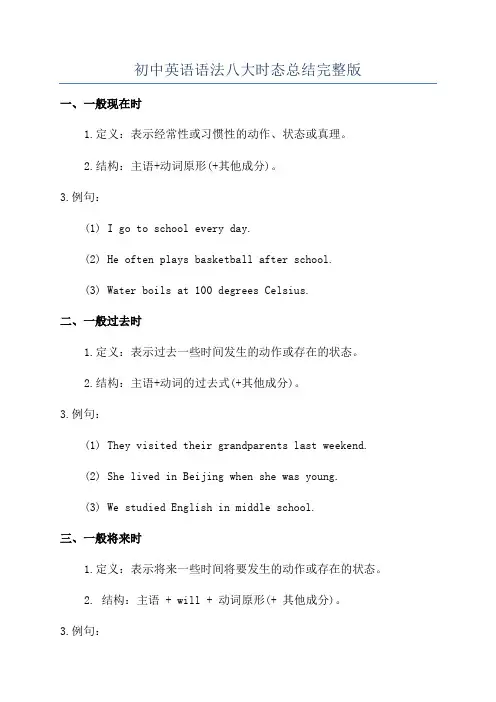
初中英语语法八大时态总结完整版一、一般现在时1.定义:表示经常性或习惯性的动作、状态或真理。
2.结构:主语+动词原形(+其他成分)。
3.例句:(1) I go to school every day.(2) He often plays basketball after school.(3) Water boils at 100 degrees Celsius.二、一般过去时1.定义:表示过去一些时间发生的动作或存在的状态。
2.结构:主语+动词的过去式(+其他成分)。
3.例句:(1) They visited their grandparents last weekend.(2) She lived in Beijing when she was young.(3) We studied English in middle school.三、一般将来时1.定义:表示将来一些时间将要发生的动作或存在的状态。
2. 结构:主语 + will + 动词原形(+ 其他成分)。
3.例句:(1) I will go to the park tomorrow.(3) We will have a party next week.四、现在进行时1.定义:表示现在正在进行的动作。
2. 结构:主语 + am/is/are + 动词-ing(+ 其他成分)。
3.例句:(1) She is reading a book right now.(2) They are playing soccer in the park.(3) We are having dinner at the moment.五、过去进行时1.定义:表示过去一些时间正在进行的动作。
2. 结构:主语 + was/were + 动词-ing(+ 其他成分)。
3.例句:(1) He was watching TV at 8 o'clock last night.(2) They were traveling in Europe during summer vacation.(3) We were studying when the phone rang.六、将来进行时1.定义:表示将来一些时间正在进行的动作。
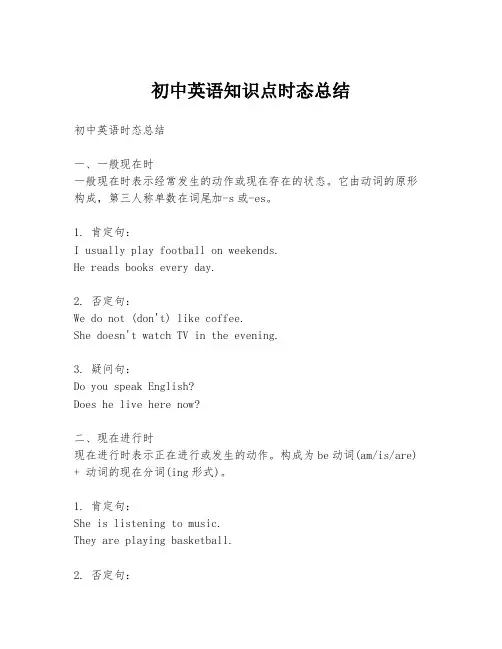
初中英语知识点时态总结初中英语时态总结一、一般现在时一般现在时表示经常发生的动作或现在存在的状态。
它由动词的原形构成,第三人称单数在词尾加-s或-es。
1. 肯定句:I usually play football on weekends.He reads books every day.2. 否定句:We do not (don't) like coffee.She doesn't watch TV in the evening.3. 疑问句:Do you speak English?Does he live here now?二、现在进行时现在进行时表示正在进行或发生的动作。
构成为be动词(am/is/are) + 动词的现在分词(ing形式)。
1. 肯定句:She is listening to music.They are playing basketball.2. 否定句:I am not (aren't) studying right now.The children are not (aren't) doing their homework.3. 疑问句:Is she cooking dinner?Are you waiting for someone?三、一般过去时一般过去时表示过去某个时间发生的动作或存在的状态。
规则动词在词尾加-ed,不规则动词则有特殊形式。
1. 肯定句:He walked to school yesterday.I visited my grandparents last week.2. 否定句:We did not (didn't) go to the cinema.She didn't buy anything at the store.3. 疑问句:Did you travel abroad last year?Did he finish his homework?四、过去进行时过去进行时表示过去某个时间点正在进行的动作。
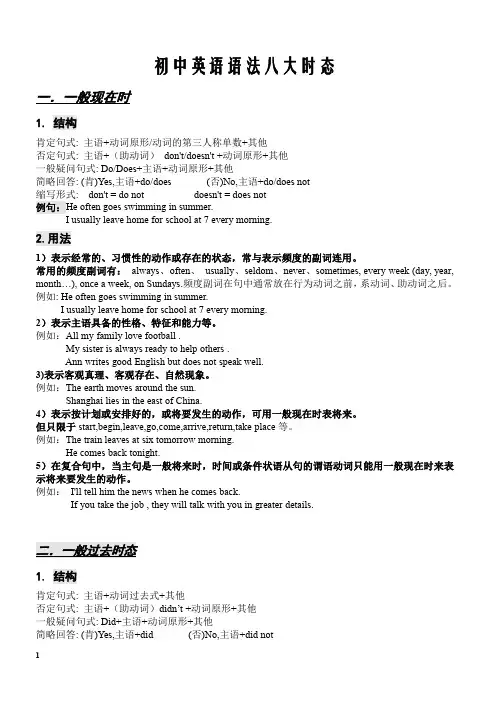
初中英语语法八大时态一.一般现在时1.结构肯定句式:主语+动词原形/动词的第三人称单数+其他否定句式:主语+(助动词)don't/doesn't+动词原形+其他一般疑问句式:Do/Does+主语+动词原形+其他简略回答:(肯)Yes,主语+do/does(否)No,主语+do/does not缩写形式:don't=do not doesn't=does not例句:He often goes swimming in summer.I usually leave home for school at7every morning.2.用法1)表示经常的、习惯性的动作或存在的状态,常与表示频度的副词连用。
常用的频度副词有:always、often、usually、seldom、never、sometimes,every week(day,year, month…),once a week,on Sundays.频度副词在句中通常放在行为动词之前,系动词、助动词之后。
例如:He often goes swimming in summer.I usually leave home for school at7every morning.2)表示主语具备的性格、特征和能力等。
例如:All my family love football.My sister is always ready to help others.Ann writes good English but does not speak well.3)表示客观真理、客观存在、自然现象。
例如:The earth moves around the sun.Shanghai lies in the east of China.4)表示按计划或安排好的,或将要发生的动作,可用一般现在时表将来。
但只限于start,begin,leave,go,come,arrive,return,take place等。
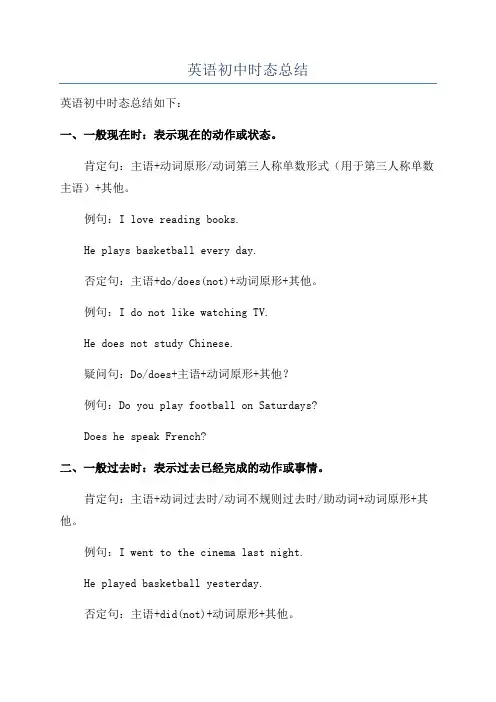
英语初中时态总结英语初中时态总结如下:一、一般现在时:表示现在的动作或状态。
肯定句:主语+动词原形/动词第三人称单数形式(用于第三人称单数主语)+其他。
例句:I love reading books.He plays basketball every day.否定句:主语+do/does(not)+动词原形+其他。
例句:I do not like watching TV.He does not study Chinese.疑问句:Do/does+主语+动词原形+其他?例句:Do you play football on Saturdays?Does he speak French?二、一般过去时:表示过去已经完成的动作或事情。
肯定句:主语+动词过去时/动词不规则过去时/助动词+动词原形+其他。
例句:I went to the cinema last night.He played basketball yesterday.否定句:主语+did(not)+动词原形+其他。
例句:I did not like the movie.He did not watch TV last night.疑问句:Did+主语+动词原形+其他?例句:Did you go to the party last night?Did he play basketball yesterday?三、现在进行时:表示现在正在进行或进行的动作。
肯定句:主语+be(am/is/are)+动词现在分词+其他。
例句:I am reading a book.He is playing basketball.否定句:主语+be(am/is/are(not))+动词现在分词+其他。
例句:I am not watching TV.He is not studying Chinese.疑问句:Be(am/is/are)+主语+动词现在分词+其他?例句:Are you playing football?Is he speaking French?四、过去进行时:表示过去一段时间内正在进行的动作。
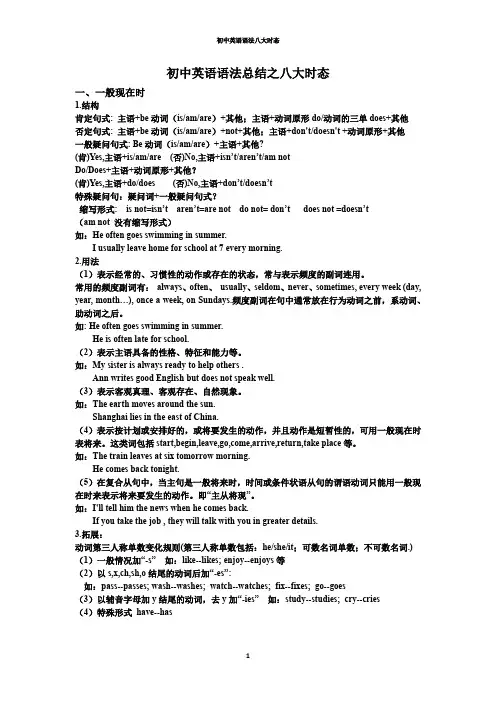
初中英语语法总结之八大时态一、一般现在时1.结构肯定句式: 主语+be动词(is/am/are)+其他;主语+动词原形do/动词的三单does+其他否定句式: 主语+be动词(is/am/are)+not+其他;主语+don't/doesn't +动词原形+其他一般疑问句式: Be动词(is/am/are)+主语+其他?(肯)Y es,主语+is/am/are (否)No,主语+isn’t/aren’t/am notDo/Does+主语+动词原形+其他?(肯)Y es,主语+do/does (否)No,主语+don’t/doesn’t特殊疑问句:疑问词+一般疑问句式?缩写形式: is not=isn’t aren’t=are not do not= don’t does not =doesn’t(am not 没有缩写形式)如:He often goes swimming in summer.I usually leave home for school at 7 every morning.2.用法(1)表示经常的、习惯性的动作或存在的状态,常与表示频度的副词连用。
常用的频度副词有:always、often、usually、seldom、never、sometimes, every week (day, year, month…), once a week, on Sundays.频度副词在句中通常放在行为动词之前,系动词、助动词之后。
如: He often goes swimming in summer.He is often late for school.(2)表示主语具备的性格、特征和能力等。
如:My sister is always ready to help others .Ann writes good English but does not speak well.(3)表示客观真理、客观存在、自然现象。
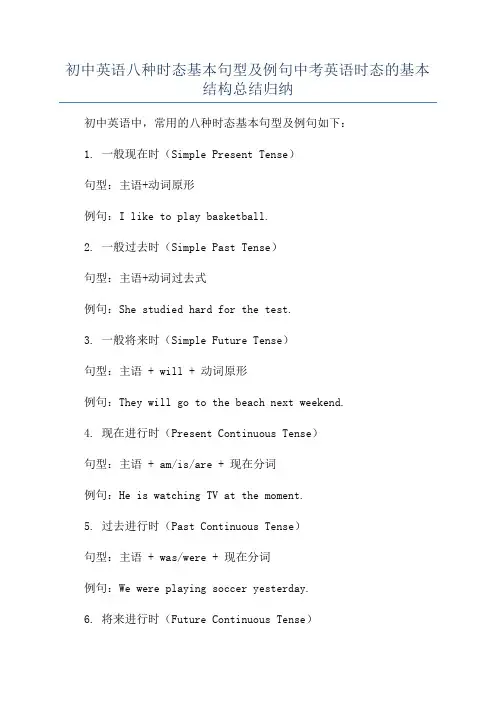
初中英语八种时态基本句型及例句中考英语时态的基本结构总结归纳初中英语中,常用的八种时态基本句型及例句如下:1. 一般现在时(Simple Present Tense)句型:主语+动词原形例句:I like to play basketball.2. 一般过去时(Simple Past Tense)句型:主语+动词过去式例句:She studied hard for the test.3. 一般将来时(Simple Future Tense)句型:主语 + will + 动词原形例句:They will go to the beach next weekend.4. 现在进行时(Present Continuous Tense)句型:主语 + am/is/are + 现在分词例句:He is watching TV at the moment.5. 过去进行时(Past Continuous Tense)句型:主语 + was/were + 现在分词例句:We were playing soccer yesterday.6. 将来进行时(Future Continuous Tense)句型:主语 + will be + 现在分词7. 现在完成时(Present Perfect Tense)句型:主语 + have/has + 过去分词例句:We have already finished our homework.8. 过去完成时(Past Perfect Tense)句型:主语 + had + 过去分词例句:He had already left when I arrived.中考英语时态的基本结构如下:1. 一般现在时:主语 + 动词原形(eg. I like swimming.)2. 一般过去时:主语 + 动词过去式(eg. She studied English last night.)3. 一般将来时:主语 + will + 动词原形(eg. We will go to the park tomorrow.)4. 现在进行时:主语 + am/is/are + 现在分词(eg. They are playing soccer now.)5. 现在完成时:主语 + have/has + 过去分词(eg. She has already finished her homework.)6. 过去进行时:主语 + was/were + 现在分词(eg. I was readinga book yesterday.)7. 过去完成时:主语 + had + 过去分词(eg. We had already left when you arrived.)8. 将来完成时:主语 + will have + 过去分词(eg. They will have finished the project by next week.)。
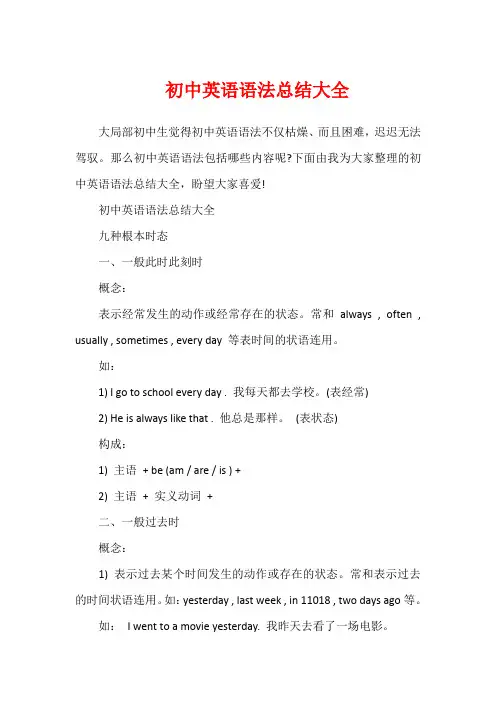
初中英语语法总结大全大局部初中生觉得初中英语语法不仅枯燥、而且困难,迟迟无法驾驭。
那么初中英语语法包括哪些内容呢?下面由我为大家整理的初中英语语法总结大全,盼望大家喜爱!初中英语语法总结大全九种根本时态一、一般此时此刻时概念:表示经常发生的动作或经常存在的状态。
常和always , often , usually , sometimes , every day 等表时间的状语连用。
如:1) I go to school every day . 我每天都去学校。
(表经常)2) He is always like that . 他总是那样。
(表状态)构成:1) 主语+ be (am / are / is ) +2) 主语+ 实义动词+二、一般过去时概念:1) 表示过去某个时间发生的动作或存在的状态。
常和表示过去的时间状语连用。
如:yesterday , last week , in 11018 , two days ago等。
如:I went to a movie yesterday. 我昨天去看了一场电影。
2) 也可表示过去经常或反复发生的动作。
如: He always went to work by bike last week.构成:1) 主语+ be (was / were ) +2) 主语+ 实义动词过去式+三、此时此刻进展时概念:表示此时此刻(说话瞬间)正在进展或发生的动作。
如:He is singing.They are watching TV now.构成:主语+ 助动词be(am/are/is) + 动词-ing形式构成.四、过去进展时概念:表示过去某一时刻或某一段时间正在进展的动作。
这一特定的过去时间除了有上下文示意外,一般用时间状语来表示。
如:1) ---What were you doing?---I was jumping.2) ---What was the boy doing when the UFO arrived?---He was sleeping.构成:主语+ 助动词be(was/were) + 动词-ing形式构成.五、一般将来时概念:表示将来某个时间要发生的动作或存在的状态,也表示将来经常或反复发生的动作,常与表示将来的时间状语连用。

初中英语语法八大时态总结一、一般现在时态(Simple Present)1.表示现在经常性、习惯性的动作或状态:- Lucy goes to school by bus every day.- They often play basketball in the park.2.表示客观事实或普遍真理:- The sun rises in the east.- Water boils at 100 degrees Celsius.3.表示评论、观点等:- I think it's a good idea.- He doesn't like swimming.二、一般过去时态(Simple Past)1.表示过去一些时间发生的动作或状态:- They visited their grandparents last weekend.- I lived in London for two years.2.表示过去的经常性动作或状态:- We often played soccer after school.- She worked in a restaurant when she was a student.3.表示与现在相反的情况或假设:- If I had money, I would buy a new car.- I wish I could go to the concert with you.三、一般将来时态(Simple Future)1.表示将来要发生的事情:- I will meet him at the airport tomorrow.- They are going to have a party next week.2.表示意愿、打算或承诺:- I promise I will help you.- She is going to study abroad next year.四、现在进行时态(Present Continuous)1.表示现在正在进行或暂时的动作:- They are playing football in the park.- He is studying for the exam.2.表示现阶段的变化或趋势:- The population of the city is increasing rapidly.- More and more people are using smartphones.五、过去进行时态(Past Continuous)1.表示过去一些时间正在进行中的动作:- I was watching TV when she called me.- They were having dinner when the power went out.2.表示过去一些时间同时发生的两个动作:- While he was reading, his sister was playing the piano.- When I arrived, they were still waiting for you.六、将来进行时态(Future Continuous)1.表示将来一些时间正在进行的动作:- He will be sleeping when you arrive.2.表示将来一些时间同时发生的两个动作:- While you are washing the dishes, I will be cleaning the bathroom.- When I call you, she will be cooking dinner.七、现在完成时态(Present Perfect)1.表示过去发生但对现在有影响的动作或状态:- I have lost my key, so I can't open the door.- She has finished her homework, so she can watch TV now.2.表示经历或遭遇过的事情:- Have you ever been to Paris?- He has never seen such a beautiful sunset.八、过去完成时态(Past Perfect)1.表示在过去一些时间之前已经发生的动作或状态:- When I arrived, they had already left.2.表示过去一些时间之前一直存在或保持的状态:- He had lived in that house for 10 years before he moved out.- She had been planning the party for weeks.。
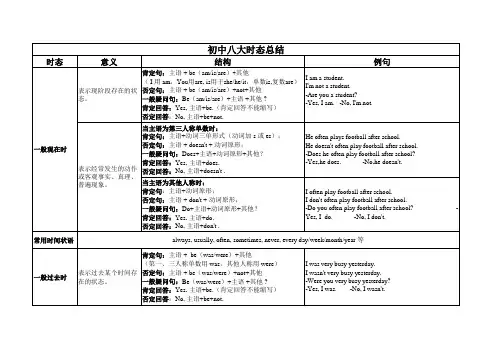
初中英语时态句式归纳总结英语时态是表示动作发生的时间的一种语法形式。
在初中英语学习中,掌握不同时态的句式结构是非常重要的。
本文将总结初中英语时态的句式,以帮助同学们更好地掌握并运用时态。
一、一般现在时1. 肯定句:主语 + 动词原形(第三人称单数需要加-s)例: She walks to school every day.2. 否定句:主语 + do/does + not + 动词原形例: They do not watch TV in the morning.3. 一般疑问句:Do/Does + 主语 + 动词原形?例: Does he play basketball on weekends?4. 特殊疑问句:特殊疑问词 + 一般疑问句句式例: What does she do after school?二、一般过去时1. 肯定句:主语 + 动词过去式例: He visited his grandparents last weekend.2. 否定句:主语 + did not + 动词原形例: We did not finish our homework yesterday.3. 一般疑问句:Did + 主语 + 动词原形?例: Did they go to the park this morning?4. 特殊疑问句:特殊疑问词 + 一般疑问句句式例: When did you watch the movie?三、一般将来时1. 肯定句:主语 + will + 动词原形例: She will visit her friend next Sunday.2. 否定句:主语 + will not + 动词原形例: They will not go to the party tomorrow. 3. 一般疑问句:Will + 主语 + 动词原形?例: Will he help me with my homework?4. 特殊疑问句:特殊疑问词 + 一般疑问句句式例: How will they go to the zoo?四、现在进行时1. 肯定句:主语 + am/is/are + 动词-ing例: They are playing soccer in the park.2. 否定句:主语 + am/is/are + not + 动词-ing例: I am not watching TV right now.3. 一般疑问句:Am/Is/Are + 主语 + 动词-ing?例: Are you studying English at the moment?4. 特殊疑问句:特殊疑问词 + 一般疑问句句式例: What are they doing in the kitchen?五、过去进行时1. 肯定句:主语 + was/were + 动词-ing例: He was watching a movie at that time.2. 否定句:主语 + was/were + not + 动词-ing例: We were not studying last night.3. 一般疑问句:Was/Were + 主语 + 动词-ing?例: Were they playing basketball when you saw them?4. 特殊疑问句:特殊疑问词 + 一般疑问句句式例: What were you doing at 8 o'clock yesterday evening?六、将来进行时1. 肯定句:主语 + will be + 动词-ing例: She will be studying English at this time tomorrow.2. 否定句:主语 + will not be + 动词-ing例: They will not be working on the project next week.3. 一般疑问句:Will + 主语 + be + 动词-ing?例: Will you be waiting for me at the airport?4. 特殊疑问句:特殊疑问词 + 一般疑问句句式例: What will they be doing at this time next year?通过对初中英语时态句式的总结,希望可以帮助同学们更好地掌握和运用不同的时态,在写作和口语表达中能够准确地描述动作发生的时间。
初中英语时态语法总结一、一般现在时(Simple Present Tense)用法一般现在时表示经常性、习惯性或客观事实上常发生的动作、状态或存在。
构成主语 + 动词原形(第三人称单数要变为动词原形+s或es)示例1.He plays football every weekend.(他每个周末踢足球。
)2.They go to school by bus.(他们乘公交车上学。
)二、一般过去时(Simple Past Tense)用法一般过去时表示过去某个时间发生的动作或状态。
构成主语 + 动词过去式示例st night, I watched a movie.(昨晚,我看了一部电影。
)2.We lived in the city for five years.(我们在城市中生活了五年。
)三、一般将来时(Simple Future Tense)用法一般将来时表示将来某个时间会发生的动作或事件。
构成主语 + will + 动词原形示例1.I will visit my grandparents next month.(下个月我会去看望我的祖父母。
)2.They will have a meeting tomorrow.(他们明天会开会。
)四、现在进行时(Present Continuous Tense)用法现在进行时表示现在正在进行或发生的动作。
构成主语 + am/is/are + 动词-ing形式示例1.We are studying English at the moment.(我们此刻正在学习英语。
)2.He is playing football in the park.(他正在公园里踢足球。
)五、过去进行时(Past Continuous Tense)用法过去进行时表示过去某个时间正在进行或发生的动作。
构成主语 + was/were + 动词-ing形式示例1.I was sleeping when you called me.(你给我打电话的时候,我正在睡觉。
一、一般现在时:表示现阶段经常或习惯发生的动作。
句子结构:主语+be (am, is, are ) + 其他 或: 主语+动词原型+其他( 第三人称单数作主语动词要加"s" )①关键词: sometimes, often, usually, always, every day, on Sunday afternoon, in the morning, five days a week, three times a month等.如:They go to the Palace Museum once a year.(他们每年去一次故宫)They often discuss business in the evening.(他们经常在晚上商谈生意)②表示客观真理、事实句子里一般不用时间状语。
如:The earth turns round the sun.(地球绕着太阳转)Light travels faster than sound.(光传播比声音快)二、一般过去时:表示过去某时发生的动作或状态句子结构:主语+be(was,were)+其他 或: 主语+动词的过去式+其他①关键词:yesterday,yesterday morning等,last week, last year, at the end of last term, 一段时间+ago on January 1st,2004, in the 1980s等. Just now, long ago, a moment ago等.如:I got up at 6:00 this morning.(我是早上六点钟起床的)Little Tom broke the window at half past nine this morning.(小汤姆今天早上九点半把窗子打破了)/如:He came to our city in the year 2000.(他2000年来到我们市)三、一般将来时:表示将来某一时刻或经常发生的动作或状态。
初中英语8个时态的简要总结一、一般现在时 (Simple Present Tense)表示经常性、惯性的动作或现象。
结构:主语 + 动词原形(第三人称单数加-s)例句:- I eat breakfast every morning.- He lives in London.- They play basketball after school.二、一般过去时 (Simple Past Tense)表示过去发生的事情或存在的状态。
结构:主语 + 动词过去式例句:- I went to the beach last weekend.- She studied French when she was in high school.- We played soccer yesterday.三、一般将来时 (Simple Future Tense)表示将要发生的事情或存在的状态。
结构:主语 + will + 动词原形例句:- I will meet my friends tomorrow.- She will travel to Japan next month.- They will study for the exam this weekend.四、现在进行时 (Present Continuous Tense)表示现在正在进行的动作。
结构:主语 + am/is/are + 动词-ing例句:- I am studying for the test.- He is watching TV right now.- They are playing soccer in the park.五、过去进行时 (Past Continuous Tense)表示过去某个时间正在进行的动作。
结构:主语 + was/were + 动词-ing例句:- We were studying when the phone rang.- She was cooking dinner at 6 pm yesterday.- They were walking in the park when it started raining.六、现在完成时 (Present Perfect Tense)表示过去发生的动作对现在造成的影响或关联。
初中英语时态总结一、一般现在时1.概念:经常、反复发生的动作或行为及现在的某种状况。
2.时间状语:Always, usually, often, sometimes, every week (day, year, month…), oncea week(day, year, month…),on Sundays,3.基本结构:动词原形(如主语为第三人称单数,动词上要改为第三人称单数形式)4.否定形式:主语+am/is/are +not+其他;此时态的谓语动词若为行为动词,则在其前加don't,如主语为第三人称单数,则用doesn't,同时还原行为动词。
5.一般疑问句:把be动词放于句首;用助动词do提问,如主语为第三人称单数,则用does,同时,还原行为动词。
6.例句:. It seldom snows here.He is always ready to help others.Action XXX..二、一般过去时1.概念:过去某个时间里发生的动作或状态;过去惯性、经常性的动作、行为。
2.时间状语:ago, yesterday, the day before yesterday, last week, last(year, night,month…), in 1989, just now, at the age of 5, one day, long long ago, once upon a time,etc.3.基本结构:be动词;行为动词的过去式4.否定形式:主语+was/were +not+其他;在行为动词前加didn't,同时还原行为动词。
5.一般疑问句:was或were放于句首;用助动词do的过去式did提问,同时还原行为动词。
6.例句:She often came to help us in those days.I didn't know you were so busy.3、目前举行时1.概念:表示现阶段或说话时正在进行的动作及行为。
初中英语50个必考句型8大时态结构,你掌握了吗?今天为大家整理的是初中英语基础的50个句型和8大时态,在中考及各种大小考中的出现频次也是很多,大家赶快看看自己有没有掌握吧!一.必背句型句型1:There+be +主语+地点状语/ 时间状语There're three books on the table.桌子上有三本书。
句型2:What's wrong with+sb./sth.?What's wrong with your telephone?你的手机有什么毛病?句型3:How do you like…?How do you like China?你觉得中国怎么样?句型4:What do you like about…?What do you like about China?你喜欢中国的什么?句型5:had better(not)+动词原形You'd better ask that policeman over there.你最好去问问那边的那个警察。
句型7:Thank+sb.+for (doing) sth.Thank you for coming to see me.感谢你来看我。
句型8:So+be/情态动词/助动词+主语He is a student. So am I.他是一个学生,我也是。
句型9:not…until…He didn't have supper until his parents came back.直到他的父母回来他才吃饭。
句型10:比较级and+比较级The baby cried harder and harder.那孩子哭得越来越厉害。
句型11:the+比较级,the+比较级The more one has,the more one wants.拥有的越多,想要的越多。
句型12:…as+adj./adv.+as……not as(so)+adj./adv.+as…Last Sunday the weather was not so wet as it is today.上个星期天的天气不如今天的天气潮湿。